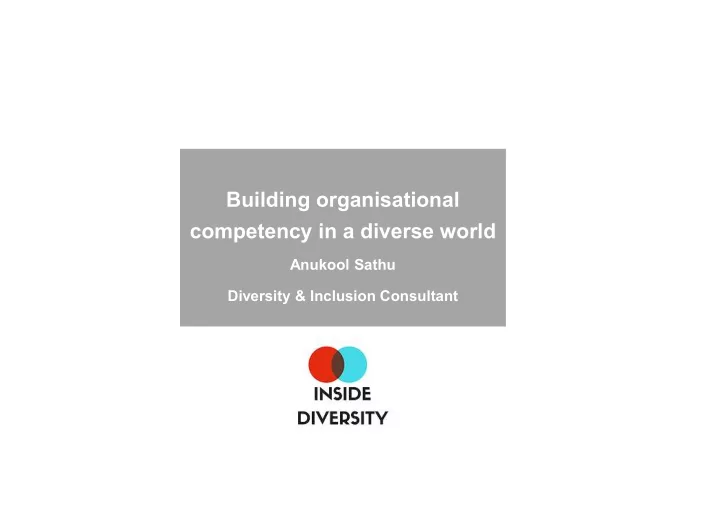

Building organisational competency in a diverse world Anukool Sathu Diversity & Inclusion Consultant
Overview New Zealand & Australia’s ethnic diversity Cognitive illusions & bias through a cultural lens Building organisational competence
Auckland's Changing Face 80 70 60 50 European Māori 40 Pacific 30 Asian 20 10 0 1991 2001 2006 2013 2038
NZ Ethnic Diversity in 2038
Australia Key facts
World Cities with the largest foreign-born populations
What Does this Mean? real differences
Video
Unconscious Bias • 11 Million bits of information every moment • Conscious mind can handle 40 bits of information • 99.999996% is unconscious..
Can you notice your bias? (Video)
Discussion • Did you sense a shift in your perception of the person? • How can this impact your area of work?
What are the impact of these biases?
“1 in 5 Australians would move if an aboriginal person sat next to them on a bus”
Bias in judicial decisions in NZ
In United States for black defendants
VIDEO ‘P erceptions of the court room’
VIDEO Impact of culture in a judicial setting
When you live don’t go to court, when you die, don’t go to hell Chinese Proverb The law in Japan is like an heirloom samurai sword, it is to be treasured but not used Obuchi J, Role of courts in the Process of Informal Dispute Resolution in Japan, 1987
Organisation Competency Spectrum An organization at this stage takes notice of the Not intentionally seeking to be changing diversity in the community, and recognizes culturally destructive. Rather, they lacks the capacity to work weaknesses in its current with people of diverse racial, services, as well as ethnic, religious and linguistic potential strengths and backgrounds. contributions of diverse cultural groups. Cultural Cultural Cultural Cultural Cultural Blindness Destructiveness Incapacity Competence Proficiency In this stage, an Policies and systems that An organization at this level: organization prides itself are destructive to cultures • demonstrates a clear capacity on being unbiased and outside the majority, to integrate cultural diversity ‘equal’. It functions with a into all aspects of its structure belief that people are all and functions basically alike, so what • Committed to the principles of works with members of social justice, equality, equity one culture works with all. and inclusion. Dominant culture wins • Cultural competence is its here. core business, not an add-on function. Figure adapted from Cross et al,. 1989: University of Michigan Health System, 2003
What can you do? Your organisation do? Build Individual competence (increase self awareness, notice cultural elements, ask questions, minimise unconscious bias) (use professional interpreters, accommodate cultural needs, don’t rely on non- verbal cues etc.) O r g a n i s a t i o n a l c o m p e t e n c e ( i n c l u s i v e h i r i n g p r a c t i c e s , e q u i t a b l e p r o c e s s e s , p r o v i d e c u l t u r a l c o u n s e l ) Dialogue with Community
Organisational shift example (Orchestra) As late as 1970s the top 5 orchestras in US, women made up fewer than 5% Blind Auditions Impact of this one change, women 50% more likely to advance These days women make up around 30% of these orchestras
Recommend
More recommend